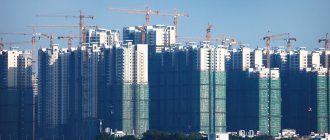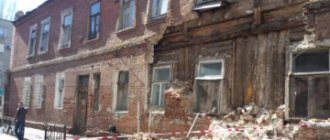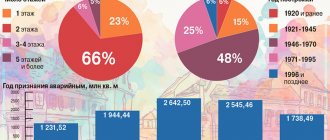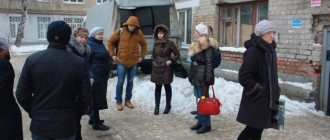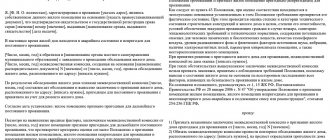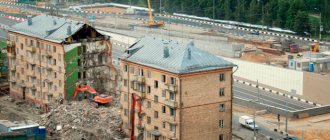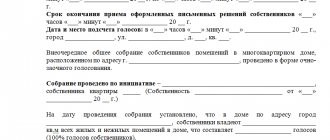Lawyer at Matyushenko and Partners Law Firm Valery Banin answers:
Only by contacting the relevant local government or state authorities. At the same time, you should write a letter to the prosecutor's office. True, the deadline for responding to citizens’ applications, in accordance with the law, is a month.
How to prove that housing is in disrepair and move to a new house
Which secondary apartments are not worth buying? Qualitative characteristics
Demolition of a collapsed emergency building in the center of Moscow has begun
At night, workers dismantled the scaffolding that surrounded the perimeter of the building, destroyed as a result of the incident, and in the morning they began dismantling the 6-story building. Now the building is in critical condition, longitudinal cracks are forming on the walls, and slopes have appeared.
“At night we carried out rescue operations, poured about 750 cubic meters of concrete into the basements and all the cavities that formed after excavation. This strengthened the foundation and prevented the possibility of collapse. Now measures are being taken to dismantle the building,” said Pyotr Biryukov.
According to him, dismantling will take at least ten days. The latest technologies will be used during demolition.
“We have prepared a unique machine that has a large boom reach and powerful hydraulic shears. It will crumble into small pieces the walls, all elements made of brick and concrete,” noted Pyotr Biryukov.
Such measures are needed in order to reduce the danger that the building now poses to people and nearby houses. It will only be safe to be near the scene of an emergency after workers have dismantled at least three floors.
The partial collapse of the building, which was under reconstruction, occurred on Sunday. Two sections of the house collapsed, from the sixth to the first floor. None of the residents of neighboring houses or pedestrians were injured.
Due to the incident, 87 residents of four nearby houses were urgently evacuated. Of these, 67 people were temporarily accommodated in nearby hotels at the expense of the city and the owner of the emergency building. Another 20 went to relatives or to their summer cottages.
The house, built in 1916, was occupied 11 years ago due to its disrepair. Last year the building acquired an owner who decided to carry out reconstruction. A restoration project was developed and passed the state examination.
According to Deputy Mayor Pyotr Biryukov, the main cause of the accident was work to strengthen the foundation, which began last Thursday. The contractor's employees removed wooden partitions and ceilings to lighten the building and added screeds to the second, fourth and sixth floors.
All work was carried out in accordance with existing regulations.
The builders managed to go 1.5–2 meters deep, after which they saw streams of water and suspended their activities. As a result, the house tilted and cracks began to appear on its walls. This was discovered by residents of neighboring houses, after which they contacted the city emergency services.
Nikolay Kosyak, head of the Rambler/Finance project, answers:
The timing of the resettlement of the house is fixed in a special program, which is adopted by local officials. However, in legislative acts this period is vaguely defined - “within a reasonable period.” That is why there are cases when local officials are in no hurry to provide new housing instead of emergency housing. Residents can challenge the timing of demolition. To do this, they need to prove that living in a dilapidated house poses a threat to their life and health. It is necessary to attract independent experts to assess the condition of the house, draw up detailed reports, and then submit the documents to the interdepartmental commission. In addition to the expert’s opinion, it is also required to provide a registration certificate of the premises, a plan of the residential premises, and copies of documents confirming the legal ownership of the property. It is also recommended to attach residents’ complaints and their signatures.
The commission is obliged to consider citizens' applications within a month. If residents of an apartment building do not agree with the officials’ verdict, then it is recommended to contact the prosecutor’s office and the court. As a rule, the consideration of such cases in court takes about three months. You can contact the municipal authorities with the court's decision. If, in this case, the provision of housing is delayed, then you can go to court again to change the method of the court’s decision - that is, get not real estate, but money.
How to buy an apartment in a building to be demolished?
Studio apartments in the old building: the main risks
Demolition and destruction of real estate: basic concepts
From August 4, 2021, changes were made to the Town Planning Code of the Russian Federation (GrK RF), which, among other things, introduced the concept of “demolition of a capital construction project” and determined the procedure for such demolition (No. 340-FZ “On Amendments to the Town Planning Code of the Russian Federation and certain legislative acts of the Russian Federation").
The demolition of a capital construction project means the liquidation of a capital construction project by its destruction (with the exception of destruction due to natural phenomena or illegal actions of third parties), dismantling and (or) dismantling of a capital construction project or its parts (clause 14.4 of Article 1 of the Civil Code of the Russian Federation).
The grounds for demolition may be:
- decision of the owner of the object;
- developer's decision;
- decisions of a court or local government body (in cases provided for by federal laws).
The decision to demolish may be made for the following reasons:
- the need to build a new property on the site of a demolished one;
- significant physical wear and tear and dilapidation of the property, which does not allow its further full use.
All of the above allows us to interpret the concept of demolition
, formulated in the Civil Code of the Russian Federation, as conscious actions of the owner of a property aimed at ending its existence.
Since the procedure for demolition of a real estate property is regulated by the Civil Code of the Russian Federation, take seriously compliance with all procedural aspects.
Accordingly, in contrast to demolition, the destruction of a real estate property is considered to be its destruction or loss of integrity and functionality, regardless of the will of the owner, due to natural phenomena, emergency situations or illegal actions of third parties.
If the degree of destruction of the property allows for reconstruction (restoration) measures to be carried out, the owner may decide to restore the property, for which permission must be obtained from the local government for reconstruction (with the exception of real estate, the construction of which does not require a permit, but also in respect of which a notification procedure applies).
If the object is completely destroyed, the owner, in order to remove it from the cadastral register and terminate ownership rights, must take a number of actions, some of which are similar to actions in the case of demolition of the property.
Answered by lawyer, K. Yu. n. Yulia Verbitskaya:
The responsibility for relocating an apartment building recognized as unsafe falls within the competence of municipal authorities. At the same time, the resettlement of a dilapidated house, as a rule, is associated with the availability of a municipality budget and living space, which must be given to residents of a dilapidated house.
Unfortunately, in practice, a situation quite often occurs when, in the absence of funds necessary for resettlement, or the lack of a sufficient number of apartments, emergency houses, despite the critical condition and the actual danger of being in them, exist unoccupied for quite a long time. At the same time, appeals and complaints, as a rule, remain unattended, since they cannot influence the increase in the budget or square meters required to resettle an emergency residential building.
What can residents do to protect themselves? The answer is obvious: you need all manifestations of physical or emergency danger. For example, record a gas leak or a collapse of brickwork that threatens the life, health and safety of people. As soon as information reaches the executive power of the region that a dilapidated house can become (or has become) a source of immediate danger to others, in order to avoid criminal and administrative liability, as well as publicity of this unsightly fact, officials act more actively. In this case, it is appropriate to contact the head of the district administration, the prosecutor's office and, of course, the media.
Why might your house be demolished?
What is the best way to dispose of ¼ shares of an apartment in a dilapidated building?
How to recognize a house as unsafe?
Lawyer Antonov A.P.
A house is recognized as unsafe and subject to demolition or reconstruction if there are appropriate grounds and in the manner prescribed by law.
The procedure for recognizing a house as unsafe To recognize a house as unsafe, we recommend following the following algorithm.
Step 1. Decide whether there are grounds for recognizing the house as unsafe. Houses are recognized as unsafe, in particular if they (clauses 34, 36, 38 of the Regulations, approved by Decree of the Government of the Russian Federation of January 28, 2006 N 47): have an emergency technical condition load-bearing building structures or an apartment building as a whole, characterized by their destruction or damage and deformations indicating the exhaustion of the load-bearing capacity and the danger of collapse of the house, and (or) tilts that can cause loss of stability; located in dangerous zones of landslides, mudflows, snow avalanches, as well as in territories that are annually inundated with flood waters and in which it is impossible to prevent flooding of the territory using engineering and design solutions; located in an area of probable destruction due to man-made accidents or other circumstances that resulted in an emergency situation, if it is impossible to prevent destruction using engineering and design solutions; received damage, including as a result of explosions, accidents, fires, uneven soil subsidence, other complex geological phenomena, emergency situations, if restoration work is impossible or impractical and the technical condition of these houses and building structures is characterized by a decrease in bearing capacity and operational characteristics, with where there is a danger to the presence of people and the safety of engineering equipment.
Step 2. Prepare and submit documents to a special commission. The assessment and inspection of an apartment building (MAD) in order to recognize it as unsafe and subject to demolition or reconstruction is carried out by an interdepartmental commission created for these purposes. The decision to recognize an apartment building as unsafe and subject to demolition or reconstruction is made by the executive body of a constituent entity of the Russian Federation or a local government body. If the apartment building is in federal ownership, such a decision is made on the basis of the conclusion of the commission by the federal executive body exercising the powers of the owner. If the MKD belongs to the federal executive body or its subordinate enterprise (institution) on the basis of the commission’s conclusion (paragraph 1, paragraph 7 of Regulation No. 47; paragraph 1 of the Appendix to the Order of the Minister of Defense of the Russian Federation dated 01/11/2017 N 11). You need to submit, in particular, the following documents to the interdepartmental commission at the location of the residential premises (clause 45 of Regulation No. 47): an application to recognize the apartment building as unsafe and subject to demolition or reconstruction; conclusion of a specialized organization that conducted the MCD examination. You can, on your own initiative, also provide information from the Unified State Register of Real Estate on the rights to residential premises and the technical passport of the residential premises (clauses 45, 45(2) of Regulation No. 47). The application and the documents attached to it can be submitted on paper in person or by mail with receipt of receipt, or in the form of electronic documents using the Unified Portal of Public Services, a regional portal (if available) or through the MFC (paragraph 8 of clause 45 of Regulation No. 47) . Additionally, we note that in Moscow you can contact the state housing inspectorate regarding this problem. It makes a decision to submit a conclusion on recognizing an apartment building as unsafe for consideration by the above-mentioned interdepartmental commission, and also carries out housing supervision over compliance with the mandatory requirements for the procedure for recognizing an apartment building as an emergency (Article 20 of the Housing Code of the Russian Federation; clauses 4.2.7, 4.3.1.4 of the Regulations, approved by Decree of the Moscow Government dated July 26, 2011 N 336-PP). It should be borne in mind that if residential premises were damaged as a result of an emergency situation, the commission makes a decision on the basis of a consolidated list of objects (residential premises) located within the boundaries of the emergency zone (hereinafter referred to as the consolidated list), formed and approved by the subject of the Russian Federation on the basis information obtained through interdepartmental interaction from the Unified State Register of Real Estate (paragraph 1, clause 42 of Regulation No. 47). In this case, no documents are required to be submitted (clause 45(1) of Regulation No. 47). The owner, copyright holder or tenant of a residential premises that was damaged as a result of an emergency has the right to apply to the commission if the specified premises are not included in the consolidated list (paragraph 2, paragraph 42 of Regulation No. 47).
Step 3. Receive a decision to recognize the house as unsafe. The interdepartmental commission considers the received application within 30 calendar days, and the consolidated list or application of the owner, legal holder or tenant of the residential premises that was damaged as a result of the emergency and is not included in the consolidated list - within 20 calendar days and makes a decision in the form of a conclusion on assessing the compliance of the MKD with the established requirements or a decision to conduct an additional examination. In case of failure to provide the necessary documents and the impossibility of requesting them through interdepartmental cooperation, the application is returned without consideration (clause 46 of Regulation No. 47). If additional examination is not required, the commission will make one of the following decisions (conclusions) (clauses 46, 47 of Regulation No. 47): on identifying the grounds for recognizing the apartment building as unsafe and subject to reconstruction; on identifying the grounds for recognizing the apartment building as unsafe and subject to demolition; about the absence of grounds for recognizing the apartment building as unsafe and subject to demolition or reconstruction. The commission’s conclusion is sent to the authorized body within three days to make a decision on recognizing the house as unsafe (clause 7, 47(1) of Regulation No. 47). If factors are identified that pose a particular danger to human life and health or pose a threat of destruction of the building due to its emergency condition, the commission’s conclusion is sent to the relevant authority, the owner of the property and the applicant no later than the working day following the day the decision is issued (clause 51 of the Regulations N 47). If the apartment building is recognized as unsafe and subject to demolition or reconstruction within five years from the date of issuance of permission to put it into operation for reasons not related to natural disasters and other force majeure circumstances, the commission will send a conclusion to the prosecutor’s office within five days (clause 51 of the Regulations N 47). Based on the received conclusion of the commission on identifying the grounds for recognizing the apartment building as emergency, the relevant authorized body, within 30 calendar days, and in the case of inspection of residential premises affected by an emergency, within 10 calendar days from the date of receipt of the conclusion, makes a decision on recognizing the apartment building as emergency and subject to demolition or reconstruction and issues, in particular, an order indicating the timing of the resettlement of citizens. Within five days from the date of adoption of this decision, the authorized body sends one copy of the order and conclusion of the commission to the applicant and to the state (municipal) housing supervision (control) body at the location of the apartment building (clauses 49, 51 of Regulation No. 47). The decision of the authorized body, as well as the conclusion of the interdepartmental commission, can be appealed by interested parties in court. It should be taken into account that resolving the issue of recognizing a house as unsafe is not within the powers of the judicial authorities (clause 52 of Regulation No. 47; section I of the Review of Judicial Practice, approved by the Presidium of the Supreme Court of the Russian Federation on April 29, 2014).
Consequences of recognizing a house as unsafe If an apartment building is recognized as unsafe and subject to demolition, the residential premises in such a house are unsuitable for living, rental and lease agreements for residential premises are terminated (clauses 34, 50 of Regulation No. 47). If an apartment building is included in a regional targeted program for the resettlement of citizens from emergency housing stock, then the owners of residential premises in such a house, at their choice, have the right to be provided with another residential premises in exchange for the seized one or to receive compensation for the seized residential premises (Parts 6 - 8, 10 of Art. 32 LC RF; clause 3 article 2, parts 1, 2, 6 article 16 of the Law of July 21, 2007 N 185-FZ; section II of the Review of Judicial Practice, approved by the Presidium of the Supreme Court of the Russian Federation on April 29, 2014). An exception is made for citizens who acquired ownership of residential premises (except for the acquisition of ownership by inheritance) after the apartment building was recognized in the prescribed manner as unsafe and subject to demolition or reconstruction. These persons have the right only to payment of appropriate compensation (Part 8.2 of Article 32 of the RF Housing Code; Letter of the Ministry of Construction of Russia dated 04/17/2020 N 15026-ME/06). In addition, government authorities of a constituent entity of the Russian Federation may establish additional support measures (in particular, in the form of subsidies for the purchase (construction) of housing or reimbursement of expenses for paying interest on a corresponding loan) for owners of residential premises who, on the date of recognition of an apartment building as unsafe and subject to demolition or reconstruction there are no other residential premises suitable for permanent residence (part 8.1 of article 32 of the Housing Code of the Russian Federation; clause 3 of part 6 of article 16 of the Law of July 21, 2007 N 185-FZ; Information from the State Corporation “Fund for Assistance to Housing and Communal Services Reform” ). If the apartment building is not included in the regional targeted program for the resettlement of citizens from emergency housing stock, then the owners of residential premises in such a house can also only count on payment of compensation to them, unless otherwise provided by an agreement with a state authority or local government (Parts 1, 8 Article 32 of the RF Housing Code, Section II of the Review). Tenants of residential premises in apartment buildings under social tenancy agreements are provided with other residential premises, which must be comfortable in relation to the conditions of the relevant locality, equivalent in total area to the previously occupied residential premises, meet established requirements and be located within the boundaries of this locality (Article 86). , 87.2, part 1, 2 of article 89 of the Housing Code of the Russian Federation).
Sincerely, lawyer Anatoly Antonov, managing partner of the law firm Antonov and Partners.
Still have questions for your lawyer?
Ask them right now here, or call us by phone in Moscow +7 (499) 288-34-32 or in Samara +7 (846) 212-99-71 (24 hours a day), or come to our office for a consultation (by pre-registration)!

